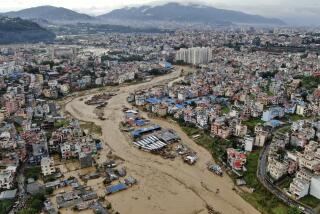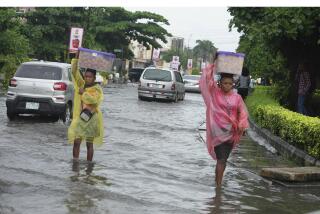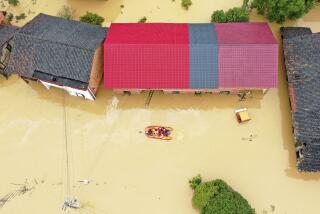Death toll could reach 3,000 in flash floods in northwest Pakistan
KARACHI, Pakistan — As many as 3,000 people may have died in flash floods that devastated northwestern Pakistan and affected almost 1 million people as the U.S. pledged aid and the United Nations started distributing food.
“The death toll could go as high as 3,000 because the level of destruction has been so great,” Mujahid Khan, chief spokesman for Edhi rescue service, said by telephone from Peshawar.
U.S. Secretary of State Hillary Rodham Clinton promised $10 million in emergency aid to Pakistan, and the U.N.’s World Food Program said it began handing out food to 35,000 families affected by the flooding as food supplies dwindle. More rains are expected in the coming days, potentially worsening the situation.
The death toll stood at 1,025, Khan said Sunday. The flood disaster follows the deaths of 152 people when a plane crashed in heavy rain near the capital, Islamabad, on Wednesday. Homes and bridges have collapsed in the rain, live electric wires have fallen into the waters, and families have been swept away.
“We can see people drowning, but we can’t go into the water because of its high pressure,” Khan said. “The relief efforts of everyone combined is only 5% of what’s required.”
The U.S. is rushing helicopters, boats, pre-fabricated bridges, mobile water treatment units and food supplies to affected areas, Clinton said in a statement Sunday.
Food distribution has begun in the worst-affected districts of Peshawar, Nowshera and Charsadda, the World Food Program said in a statement on its website. Floodwaters “have also caused significant damage” to the U.N. agency’s warehouses in northwestern Pakistan, although the full extent of the losses has yet to be determined.
Prime Minister Yousuf Raza Gilani, who toured the stricken province by air, ordered the government to provide food to people at safe locations. The United Nations has said almost 1 million people have been affected by the floods.
Floods may reach the southern province of Sindh in the next few days, Information Minister Sumsam Bokhari told a news conference in Islamabad on Saturday. The Sindh government has ordered residents along the banks of the Indus River to be evacuated.
Army troops equipped with life jackets, motorboats and heavy rafts have been called in to help move families to safety, according to a statement on the military’s website.
Pakistani television channels showed images of people on flooded roads grabbing wreckage to keep from being swept away, of drowning goats and buffalo, and makeshift boats.
“All the houses in my village have been destroyed, and now it’s simply a fight for survival,” Mehmood Khan, a tribal elder, said by telephone from Wana, South Waziristan. “Food supplies have started to run out. We haven’t eaten in 48 hours and the scant food supplies we saved for women and children may not last long.”
U.K. charity Oxfam said the flood may be Pakistan’s worst for 35 years. “People in the flood’s wake were already desperately poor, and what little possessions they had have been washed away,” said Jane Cocking, Oxfam’s humanitarian director. The charity said it was considering a “sizable aid package.”
The districts of Nowshera, Charsadda, Peshawar, Swat, and Lower Dir are the worst affected, according to the government.
The first spell of the monsoon started July 22 and affected the western province of Baluchistan, according to the National Disaster Management Agency in Islamabad.
More to Read
Sign up for Essential California
The most important California stories and recommendations in your inbox every morning.
You may occasionally receive promotional content from the Los Angeles Times.










